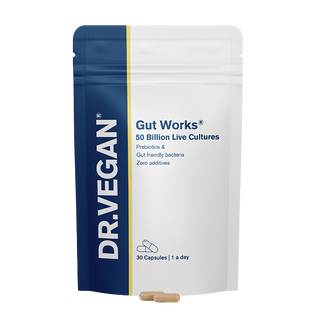SIBO treatments

In our article ‘5 signs that you may have SIBO’ we gave an overview of a condition called ‘Small Intestinal Bacterial Overgrowth’ otherwise known as SIBO. According to the NHS an estimated 13 million people in the UK suffer with irritable bowel syndrome (IBS), a digestive problem that can have a profound impact on quality of life. It is further estimated that as many as 80% of these have SIBO and that an even larger number of people in the UK suffer from food intolerances. In this article, expert nutritionist Sue Potgieter highlights the various treatment options to help manage SIBO.
When treating SIBO, the overgrowth needs to be addressed as well as the root cause. SIBO can potentially cause complications, and therefore it is always best to work with a health practitioner or a SIBO practitioner and to test regularly when treating SIBO. This is to rule out the treatments that don't work and to monitor progress.
Potential SIBO causes
If you’ve already been diagnosed with Crohn’s disease, Parkinson’s, GORD, or hypothyroidism, you may be more at risk of developing SIBO. Rosacea, restless leg syndrome, interstitial cystitis, psoriasis and rheumatoid arthritis may also be signposts to possible SIBO. SIBO can also develop from a bout of food poisoning (even from years ago) or from living in a mouldy house. Mould toxicity and various tests can determine if that is the case. PPI treatments for acid reflux and GORD such as Omeprazole, Nexium and Lansoprazole have been shown in recent studies to be a significant risk factor for SIBO. Read more about the 5 signs that you may have SIBO.
Diet
Diet is the first key factor that should be addressed in helping to manage symptoms associated with SIBO. Many sufferers experience relief from their symptoms simply by implementing various dietary changes.
Some of these changes include:
- Decreasing processed and ultra-processed foods.
- Eliminating common food intolerance triggers such as wheat / gluten; dairy / lactose; eggs; soy and corn.
- Adding a leaky gut healer such as bone broth (if not vegan / vegetarian) and supportive herbs such as peppermint and ginger. These can be added in their raw form or in supplement form.
If there is no improvement, a low FODMAP diet can be introduced. FODMAP stands for fermentable oligosaccharides, disaccharides, monosaccharides and polyols. These short-chain carbohydrates (sugars) are difficult to digest by the small intestine, and a low FODMAP diet eliminates these carbohydrates from the diet. This strategy may help you identify the triggers of your symptoms and the best foods to avoid. A staged reintroduction of foods that have been eliminated and monitoring your symptom experience will determine whether these changes are necessary in the short term or long term. Keeping a symptom diary can be very useful at this point.
Supplements
The second factor is to include targeted supplements when appropriate, such as probiotics, digestive enzymes and / or L-Glutamine. Probiotics can be useful for H-SIBO (Hydrogen-producing SIBO) to reduce pain and also bloating. One strain in particular that is especially helpful is Lactobacillus plantarum. You may not experience immediate effects when starting probiotics however and the inclusion of inulin in prebiotics may cause issues for some SIBO sufferers.
You may be interested in pairing GastroAid with Gut Works®. GastroAid® is an advanced formula of betaine, digestive enzymes, and botanicals to regulate stomach acid and the efficient breakdown of food, maintaining balance and comfort in the digestive system. Gut Works® is the multi award-winning, high-strength supplement supporting optimal gut health, healthy bowels, intestinal function, digestion, and the gut microbiome.
Gut Works®

Antimicrobial treatment
If the first two interventions aren’t helping, an antimicrobial treatment may be necessary, which could be in the form of antibiotics or herbal antimicrobials. Depending on the severity of the SIBO, it may take several courses of antibiotics and a prokinetic in between to see any improvement. A prokinetic helps to support the transition of food through the digestive tract, increasing motility and transit time.
Working with SIBO is like a flow chart; once a course of antibiotics has been completed, another breath test should be performed to see whether there is any change. If there isn’t a sizeable improvement, an additional course/s of antibiotics may be necessary. If 80-90% of symptoms have been resolved, the next stage in the flowchart is to prevent a relapse using diet, a prokinetic and probiotics.
Should a relapse occur (and it is very common in SIBO patients), an additional course of antibiotics would then be needed. Until the root cause or origin of the SIBO has been identified, this can be an ongoing process.
Herbal antimicrobials can also be used instead of antibiotics but can take up to 6 weeks to work, making it a longer process.
Finding a SIBO practitioner and resources
If you don’t know where to start, we recommend booking an appointment with your GP. Breath tests can also be sourced via a private lab but should be undertaken when working alongside a practitioner. It can be a long journey when diagnosed with SIBO so do reach out to our lovely nutritionists here via our team@drvegan.com email address for support.
Gut health experts:
- Dr Allison Siebecker is a renowned expert on SIBO.
- Dr Michael Ruscio is a gut health expert, who has extensive information on his website.
View our range of award-winning probiotics, vitamins and supplements.
You may enjoy reading:

















